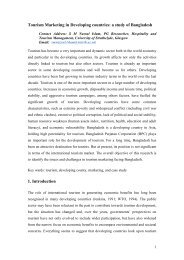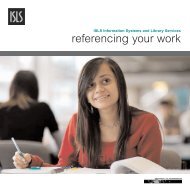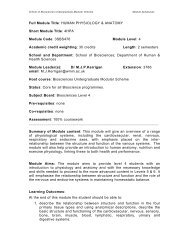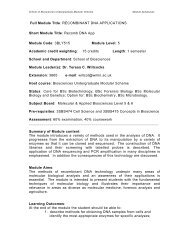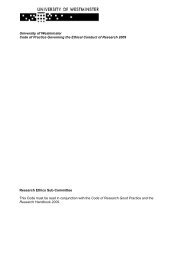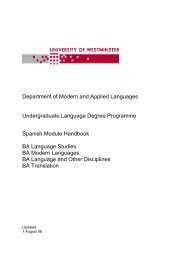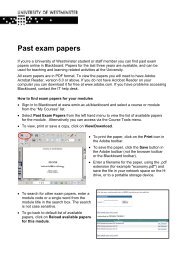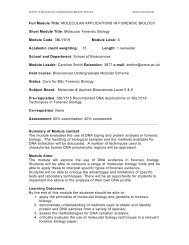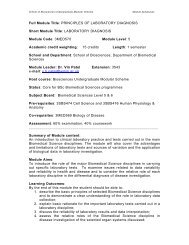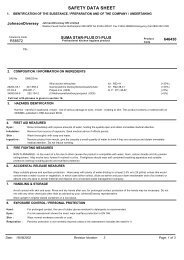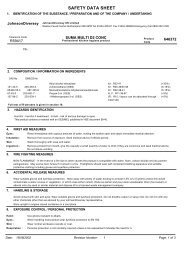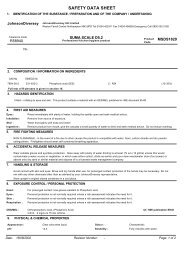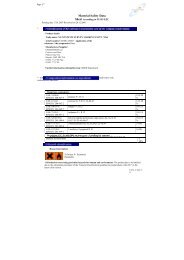CONTENTS 1. Introduction 1.1 Course Outline 1 1.2 Introduction ...
CONTENTS 1. Introduction 1.1 Course Outline 1 1.2 Introduction ...
CONTENTS 1. Introduction 1.1 Course Outline 1 1.2 Introduction ...
You also want an ePaper? Increase the reach of your titles
YUMPU automatically turns print PDFs into web optimized ePapers that Google loves.
For the purposes of gaining credits which can count towards the taken and passed requirements for<br />
an award, a student who is attempting a module must register for the module and complete, with<br />
attendance, the diet of assessment as defined in the module specification, to the necessary<br />
standard (ie “taken” or passed as above).<br />
Re-attempt (retake)<br />
Where a student has failed a module, the Assessment Board may at its discretion, permit the<br />
student to re-attempt the module. Re-attempting a module is effectively doing the module again,<br />
with attendance. If a student re-attempts (repeats with attendance) a module, they must re-register<br />
for the module and complete all assessments (including all coursework, practicals, in-class tests,<br />
critical reviews of studio work, examinations or other form of assessment requirements), as<br />
specified by the Assessment Board. This applies regardless of the marks the student achieved in any<br />
element of assessment at the first attempt.<br />
The actual marks awarded in a second attempt will be capped at the pass mark (40%) irrespective<br />
of the actual marks achieved.<br />
Modules may be attempted only twice (ie. a first attempt and a subsequent re-attempt). At the<br />
discretion of an Assessment Board, a student may be offered the opportunity of reassessment once<br />
only on each occasion that they attempt the module provided that they have achieved an overall<br />
module mark of at least 30%.<br />
For the purposes of counting the number of credits that have been attempted towards the award of<br />
an Honours degree a student must not have attempted more than 330 credits at Credit Levels 5 and<br />
6 (s20.131c of the Modular Framework for Undergraduate <strong>Course</strong>s). A first attempt of any module<br />
will count as an attempt, and a reattempt of any module that a student has failed will count as a<br />
further separate attempt. However reassessment following failure at the first attempt will not count<br />
as a further separate attempt.<br />
For example, if a student is reassessed in a 15 credit module following failure at the first attempt,<br />
then the first attempt and the reassessment will count as 15 credits attempted (in total). If a<br />
student re-attempts a 15 credit module following failure in that module at the first attempt, the first<br />
attempt and the re-attempt shall together count as 30 credits attempted (irrespective of any<br />
reassessments).<br />
Reassessment (refer)<br />
If a student fails to achieve an overall pass in a module and/or a satisfactory standard in any part of<br />
the module, an Assessment Board may decide at its discretion to allow the student to be reassessed<br />
(to resit part of or the whole module) by a date the Subject Board will set. A student will not<br />
normally be reassessed in a part of the module assessment in which they have already achieved<br />
the necessary standard. To be eligible to resit in part or the whole of a module a student must have<br />
achieved a minimum overall mark of 30% in the module.<br />
Reassessment in a part or all of a module does not normally involve re-registering for the module or<br />
attendance. It is also known as “referral” or “resit”. At the discretion of the Subject Board a student<br />
may be reassessed once only on each occasion that they attempt a module. Any student who is<br />
offered reassessment but who does not take up the offer will retain the fail mark originally recorded<br />
for the module. The overall mark for any module successfully completed following reassessment<br />
(resit) will be capped at the pass mark (40% for undergraduate modules) irrespective of the actual<br />
mark the student achieves.<br />
Refer<br />
This term is used on student transcripts and profiles to indicate that an Assessment Board has<br />
agreed to offer the student the opportunity of reassessment (re-sit) in a module (see<br />
“reassessment” above). Students are reminded that when they are reassessed in a module or any<br />
part of a module the overall mark will be capped at the pass mark (40%) regardless of the actual<br />
mark the student achieves.<br />
DPI_Hbook 93 ©University of Westminster



